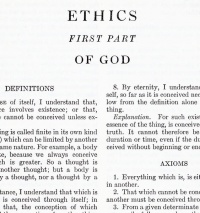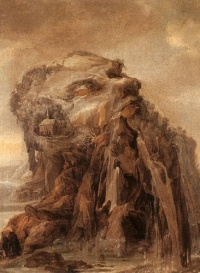17th century
From The Art and Popular Culture Encyclopedia
(Difference between revisions)
| Revision as of 20:05, 10 February 2011 Jahsonic (Talk | contribs) ← Previous diff |
Revision as of 22:30, 10 February 2011 Jahsonic (Talk | contribs) Next diff → |
||
| Line 1: | Line 1: | ||
| + | [[Image:Iconologia.jpg|thumb|right|200px|''[[Iconologia]]'' (1593) by [[Cesare Ripa]] was an [[emblem book]] highly influential on [[Baroque]] imagery]] | ||
| [[Image:Joos de Momper.jpg|thumb|right|200px|''[[Anthropomorphic]] [[Landscape]]'' (early [[17th century]]) by [[Joos de Momper]]]] | [[Image:Joos de Momper.jpg|thumb|right|200px|''[[Anthropomorphic]] [[Landscape]]'' (early [[17th century]]) by [[Joos de Momper]]]] | ||
| [[Image:Theatre from Ars Memoriae by Robert Fludd.jpg|thumb|right|200px|''[[Ars Memoriae]]'': The [[Theatre]] ([[1619]]) - [[Robert Fludd]]]] | [[Image:Theatre from Ars Memoriae by Robert Fludd.jpg|thumb|right|200px|''[[Ars Memoriae]]'': The [[Theatre]] ([[1619]]) - [[Robert Fludd]]]] | ||
Revision as of 22:30, 10 February 2011

By virtue of his magnum opus, the posthumous Ethics, Spinoza is considered one of Western philosophy's definitive ethicists.

Illustration to the Speculum Sophicum Rhodostauroticum (1618) by Teophilus Schweighardt Constantiens
|
Related e |
|
Featured: |
As a means of recording the passage of time, the 17th century was that century which lasted from 1601-1700.
The 17th century falls into the Early Modern period of Europe and was characterized by the Baroque cultural movement and the beginning of modern science and philosophy, including the contributions of Galileo Galilei, René Descartes, Blaise Pascal, Isaac Newton; Europe was torn by warfare throughout the century by the Thirty Years' War, while European colonization of the Americas began in earnest.
The year 1600 is hailed by many as the beginning of the era of modern freethought, as it is marked by the execution in Italy of Giordano Bruno by the Holy Inquisition.
Contents |
Significant people
Visual artists
- Gian Lorenzo Bernini, Italian sculptor, architect (1598 – 1680)
- Francesco Borromini, Italian sculptor, architect (1599–1667)
- Frans Hals (1580–1666)
- Bartolomé Esteban Murillo, Spanish painter (1617 – 1682)
- José de Ribera, Lo Spagnoletto (1591 – 1652)
- Rembrandt van Rijn, Dutch painter (1606 – 1669)
- Peter Paul Rubens, Flemish painter, 1577 – 1640
- Jan Steen (1626–1679)
- Ruisdael (1628–1682)
- Jiang Tingxi, Chinese painter, calligrapher, encyclopedist, foreign delegate to Japan (1669 – 1732)
- Diego Rodríguez de Silva y Velázquez, Spanish painter (1599–1660)
- Johannes Vermeer, Dutch Painter (1632 – 1675)
- Francisco Zurbarán, Spanish Painter (1598 – 1664)
Literature
- Pedro Calderón de la Barca, Spanish dramatist (1600 – 1681)
- Miguel de Cervantes Saavedra, Spanish author (1574 – 1616)
- Pierre Corneille, French dramatist (1606 – 1684)
- Nicolas Boileau-Despréaux, French poet and critic (1636 – 1711)
- Daniel Defoe, English writer, novelist (1659 or 1661 – 1731)
- John Donne, English metaphysical poet (1572 – 1631)
- John Dryden, English poet, literary critic, translator, and playwright (1631 – 1700)
- Jean de La Fontaine, French poet (1621 – 1695)
- Andreas Gryphius, German poet and dramatist (1616 – 1664)
- Ben Jonson, English dramatist c.1572 – 1637)
- John Milton, English author and poet (1608 – 1674)
- Molière, French dramatist, actor, director (1622 – 1673)
- Miyamoto Musashi, famous Samurai warrior in Japan, author of 'The Book of Five Rings,' a treatise on strategy and martial combat, poet, painter, (1584 – 1645)
- Samuel Pepys, English civil servant and diarist (1633 – 1703)
- Francisco de Quevedo, Spanish writer (1580 – 1645)
- Jean Racine, French dramatist (1639 – 1699)
- William Shakespeare, English author and poet (1564 – 1616)
- Félix Lope de Vega, Spanish playwright and poet (1562 – 1635)
- John Wilmot, 2nd Earl of Rochester, English poet (1647 – 1680)
Musicians and composers
- Johann Christoph Bach, Composer and great-uncle of the genius, (1642–1703)
- Johann Sebastian Bach, German composer of genius (1685–1750)
- Georg Friedrich Handel, German Composer (1685–1759)
- Jean-Baptiste Lully, Italian-born French composer (1632 – 1687)
- Claudio Monteverdi, Italian composer of Renaissance and Baroque music, and possibly the first opera ever (1567 – 1643)
- Johann Pachelbel (1653–1706), German composer
- Henry Purcell, English composer (1659 – 1695)
- Monsieur de Sainte-Colombe, French composer and the subject of a 1991 film Tous les matins du monde (c. 1640 – 1700)
- Antonio Vivaldi Italian composer (four seasons concerti) (1678–1741)
Philosophy
- Francis Bacon (1561–1626)
- Thomas Browne (1605–82)
- Mir Damad (d. 1631)
- Thomas Hobbes (1588–1679)
- Mulla Sadra (1571–1640)
- René Descartes (1596–1650)
- Blaise Pascal (1623–1662)
- Baruch Spinoza (1632–1677)
- Francisco Suárez (1548–1617)
- John Locke (1632–1704)
- Nicolas Malebranche (1638–1715)
- Isaac Newton (1642–1727)
- Gottfried Leibniz (1646–1716)
- Pierre Bayle (1647–1706)
- Damaris Cudworth Masham (1659–1708)
- Mary Astell (1666–1731)
- Galileo Galilei (1564–1642)
- John Milton (1608–1674)
See also
Unless indicated otherwise, the text in this article is either based on Wikipedia article "17th century" or another language Wikipedia page thereof used under the terms of the GNU Free Documentation License; or on research by Jahsonic and friends. See Art and Popular Culture's copyright notice.


,_Utriusque_cosmic_maioris_scilicet_et_minoris_metaphysica.jpg)

